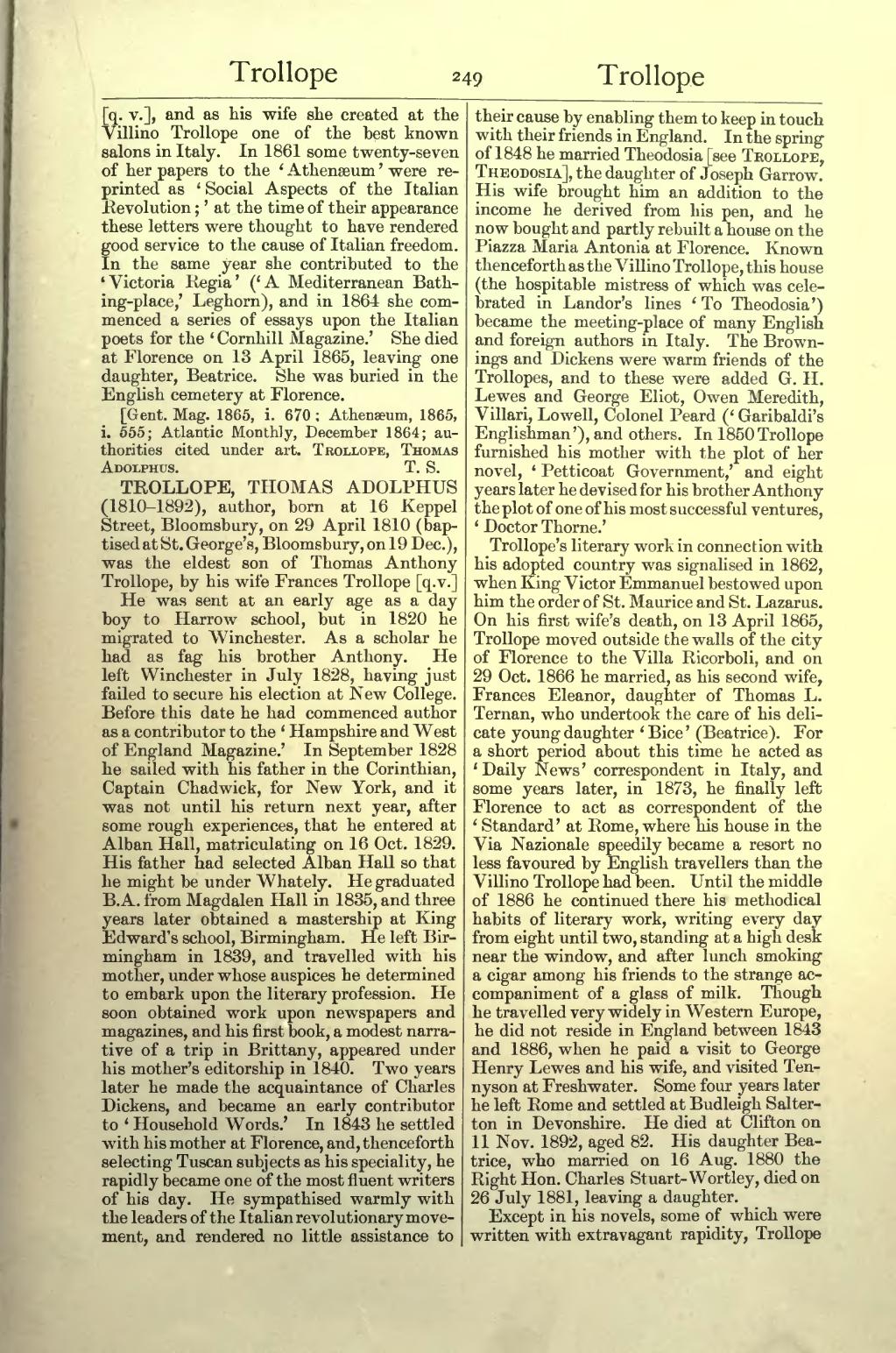[q. v.], and as his wife she created at the Villino Trollope one of the best known salons in Italy. In 1861 some twenty-seven of her papers to the ‘Athenæum’ were reprinted as ‘Social Aspects of the Italian Revolution;’ at the time of their appearance these letters were thought to have rendered good service to the cause of Italian freedom. In the same year she contributed to the ‘Victoria Regia’ (‘A Mediterranean Bathing-place,’ Leghorn), and in 1864 she commenced a series of essays upon the Italian poets for the ‘Cornhill Magazine.’ She died at Florence on 13 April 1865, leaving one daughter, Beatrice. She was buried in the English cemetery at Florence.
[Gent. Mag. 1865, i. 670; Athenæum, 1865, i. 555; Atlantic Monthly, December 1864; authorities cited under art. Trollope, Thomas Augustus.]
TROLLOPE, THOMAS ADOLPHUS (1810–1892), author, born at 16 Keppel Street, Bloomsbury, on 29 April 1810 (baptised at St. George's, Bloomsbury, on 19 Dec.), was the eldest son of Thomas Anthony Trollope, by his wife Frances Trollope [q. v.]
He was sent at first as a day boy to Harrow school, but in 1820 he was elected scholar at Winchester, where he had as fag his brother Anthony in 1826. He left Winchester in July 1828, having just failed to secure his election at New College. Before this date he had commenced author as a contributor to the ‘Hampshire and West of England Magazine.’ In September 1828 he sailed with his father in the Corinthian, Captain Chadwick, for New York, and it was not until his return next year, after some rough experiences, that he entered at St. Alban Hall, matriculating on 16 Oct. 1829. His father had selected St. Alban Hall so that he might be under Whately. He graduated B.A. from Magdalen Hall in 1835, and three years later obtained a mastership at King Edward's school, Birmingham. He left Birmingham in 1839, and travelled with his mother, under whose auspices he determined to embark upon the literary profession. He soon obtained work upon newspapers and magazines, and his first book, a modest narrative of a trip in Brittany, appeared under his mother's editorship in 1840. Two years later he made the acquaintance of Charles Dickens, and became an early contributor to ‘Household Words.’ In 1843 he settled with his mother at Florence, and thenceforth selecting Tuscan subjects as his speciality, he rapidly became one of the most fluent writers of his day. He sympathised warmly with the leaders of the Italian revolutionary movement, and rendered no little assistance to their cause by enabling them to keep in touch with their friends in England. In the spring of 1848 he married Theodosia [see Trollope, Theodosia], the daughter of Joseph Garrow. His wife brought him an addition to the income he derived from his pen, and he now bought and partly rebuilt a house on the Piazza Maria Antonia at Florence. Known thenceforth as the Villino Trollope, this house (the hospitable mistress of which was celebrated in Landor's lines ‘To Theodosia’) became the meeting-place of many English and foreign authors in Italy. The Brownings and Dickens were warm friends of the Trollopes, and to these were added G. H. Lewes and George Eliot, Owen Meredith, Villari, Lowell, Colonel Peard (‘Garibaldi's Englishman’), and others. In 1850 Trollope furnished his mother with the plot of her novel, ‘Petticoat Government,’ and eight years later he devised for his brother Anthony the plot of one of his most successful ventures, ‘Doctor Thorne.’
Trollope's literary work in connection with his adopted country was signalised in 1862, when King Victor Emmanuel bestowed upon him the order of St. Maurice and St. Lazarus. On his first wife's death, on 13 April 1865, Trollope moved outside the walls of the city of Florence to the Villa Ricorboli, and on 29 Oct. 1866 he married, as his second wife, Frances Eleanor, daughter of Thomas L. Ternan, who undertook the care of his delicate young daughter ‘Bice’ (Beatrice). For a short period about this time he acted as ‘Daily News’ correspondent in Italy, and some years later, in 1873, he finally left Florence to act as correspondent of the ‘Standard’ at Rome, where his house in the Via Nazionale speedily became a resort no less favoured by English travellers than the Villino Trollope had been. Until the middle of 1886 he continued there his methodical habits of literary work, writing every day from eight until two, standing at a high desk near the window, and after lunch smoking a cigar among his friends to the strange accompaniment of a glass of milk. Though he travelled widely in Western Europe, he did not reside in England between 1843 and 1886. While at home on one occasion he visited George Henry Lewes and ‘George Eliot,’ and also Tennyson at Freshwater. In 1890 he left Rome and settled at Budleigh Salterton in Devonshire. He died at Clifton on 11 Nov. 1892, aged 82. His daughter Beatrice, who married on 16 Aug. 1880 the Right Hon. Charles Stuart-Wortley, died on 26 July 1881, leaving a daughter.
Except in his novels, some of which were written with extravagant rapidity, Trollope
